from
https://www.marketingprofs.com/chirp/2017/32533/socialskim-linkedins-new-website-demographics-whatsapps-business-chat-10-stories-this-week

This week on the Hubcast, Marcus and George talk video marketing, two important new integrations with HubSpot, and lead conversion tutorials on...
The post Hubcast 147: Ask Nicely, Live Chat, Event Forms & #GSD appeared first on The Sales Lion.

Wondering why your videos aren't performing as well as you anticipated? These common mistakes and pitfalls might be the difference between highly...
The post 12 Common Mistakes Video Marketing Beginners Make appeared first on The Sales Lion.

Are you a HubSpotter looking to take your Inbound Marketing to the next level? Would you like to stay up to date on all the latest and greatest HubSpot tools, tips, and ...
The post Hubcast 146: Ric Flair, Andy Cohen, Wistia, & HubSpot Deals appeared first on The Sales Lion.

It’s scary, isn’t it?
Having to tell a truth to someone who may not want to hear it.
Whether you have to tell a friend they’ve been betrayed, inform a client that their ideas suck, or write a blog post to burst your reader’s bubble, hard truths can feel almost as painful to deliver as they are to receive.
Because just the thought of hurting someone is scary. You don’t want that.
And you don’t know how they’ll react. They might think you’re a jerk and cut all ties with you. You don’t want that either.
So sometimes you obfuscate the truth to spare them the pain of hearing it. Sometimes you even keep it to yourself or tell a white lie.
Well, I have to tell you something, and you may not like to hear it. But if you struggle with the art of being frank, you need to hear this. It will make you a better person, a better communicator and a better blogger.
So here it is …
You’re a coward.
If you can’t be brutally honest with people, especially when you know it’s in their best interest, you’re a coward.
You’re not doing anyone a favor by withholding a truth from them, even if it’s difficult for them to hear.
The only person you’re protecting is yourself. Because you’re afraid of the consequences to you.
But it’s not about you.
Being honest is about making sure your audience has the information they need to make good decisions. That includes information they may not like.
You may convince yourself it’s “nicer” to hide or obfuscate things that are difficult for them to hear, but it’s not.
Ignorance doesn’t lead to bliss, it leads to bad decision-making. There’s nothing “nice” about that.
And as a blogger trying to help your readers, honesty is that much more important.
Because readers rely on your expertise and your candor. They rely on you to set them straight when they’re headed the wrong way. They rely on you to guide them in the right direction.
You may fear you’ll lose readers when you tell them a hard truth, but withholding it is far riskier. Because it will hurt your credibility in the long run.
When you’re honest at all times, whether in your writing or in your personal life, people will know what to expect from you. And when they need the truth, you’re the one they will come to.
Yes, you may lose some readers along the way, but you’ll gain the trust and respect of so many more.
Brutal honesty is not about being cruel, rude, shocking, or harsh. That’s not brutal honesty. It’s just brutal.
If that’s what you’re going for, you’re doing it wrong.
Maybe that seems obvious to you, but many people mistake brutal honesty for honest brutality. You’ve probably experienced more than your share. So if it’s that obvious, why do so many people make this mistake?
Because it’s not obvious. In fact, it’s almost counterintuitive.
Many people think that the point of brutal honesty is to shock someone into hearing you. They think that the point is to be so harsh that the other person can’t help but hear the truth.
But that’s not really how it works. Treating people harshly will only make them less receptive to what you have to say, not more.
The point of brutal honesty is to be completely honest and let the truth speak for itself. It’s about not holding anything back — about not telling white lies to make a person feel better, or withholding information they might find hurtful. Those are things we do on a regular basis, and the point of brutal honesty is to stop doing that.
You see, the emphasis in brutal honesty should be on the honesty, not on the brutality.
It is the truth that you need to deliver, and not your delivery itself, that needs to be brutally unrestrained.
Of course, the problem is that being brutally honest isn’t just hard to do—it’s hard to do well. That’s because it’s not just about what you say; it’s also about why, when, and how.

Honesty is always a good policy, but not every situation calls for brutal honesty. So how do you know when it’s time to hold nothing back?
At the end of the day, it’s about assessing the situation, being clear about your purpose, and using your judgment.
But here are three common scenarios that often call for brutal truth:
Whenever someone comes to you to confirm their delusions, you need to do the exact opposite.
For example, many bloggers might love to hear that all they need to do to make money is write posts and slap ads on them. They might want to hear that riches are right around the corner, even if they only just got started. But what they need to hear is that there’s no such thing as easy success, that it takes time, and that they must adjust their expectations.
Trying to sugar-coat this reality wouldn’t help them.
You wouldn’t let a friend walk blindly into traffic without reaching out a hand to pull them back. Hell, you wouldn’t even be so inconsiderate to a stranger.
So why would you let them make a harmful decision without trying to save them from it?
Sure, walking into traffic is likely to cause them serious harm — but so is making a decision that would ruin their career, blow their life savings, or land them in jail.
If they’re about to make a big mistake — or even if they’ve already made the mistake — your willingness to be brutally honest with them might just be the thing that saves them from future pain.
How do you know when brutal honesty is called for?
When nothing else has worked. By all means, try a subtler, gentler approach first—but when nothing seems to get through to them, it’s time to take off the kid gloves and tell them what they need to hear, without holding back.
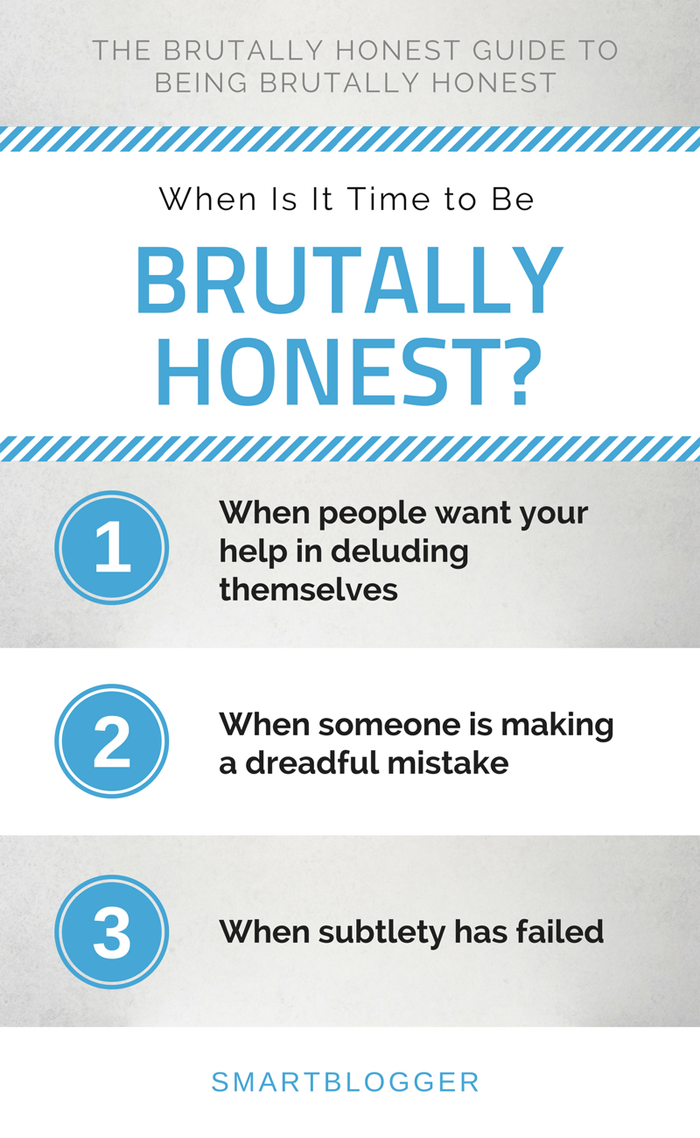
These aren’t the only circumstances which call for brutal honesty, but they are frequent ones, and they have two basic principles in common: the hearer badly needs to be told the truth, and yet it is very difficult for them to discover or receive it.
And that’s where you come in.
Great. So you understand what brutal honesty is, and what it is not. You know why brutal honesty is sometimes necessary, and when it is appropriate.
Now comes the hard part: How do you actually do it?
Here is an eight-step process to help you deliver that hard truth.
Brutal honesty begins with yourself. If you’re hesitant and tend to shy away from bluntly honest conversations, then the first step is to acknowledge why you hesitate.
Are you afraid of offending people? Ask yourself whether allowing them to continue on a harmful path is kinder than having an uncomfortable conversation with them.
Are you afraid that people will get mad at you, and perhaps cut ties with you? Do you worry about losing readers, subscribers, or clients?
As I mentioned above, ask yourself whether they’re better off not knowing, or whether you just don’t want to be the one to tell them.
Remind yourself that this is about doing what is best for them, not what is easiest on you.
In the first step, you checked your motives for not wanting to be brutally honest with someone. In this step, flip that around—ask yourself if being honest with them is really about their well-being, or if it’s about you.
Yeah, that happens, too.
If it’s more about your desire to speak your mind than about what they need to hear, you’re likely to end up falling into that trap of being more brutal than honest.
So ask yourself this classic trio of questions about your message:
If the answer to all three isn’t yes, it’s time to reevaluate.
Remember, the point is always honesty, not brutality.
You can tell the brutal truth without being brutal yourself. Let the truth be merciless on its own. It is hard enough for many to hear and face. So don’t add to it. Be kind.
Let me say that again: Tell them the whole truth, no matter how brutal it may be, but do it with kindness and empathy.
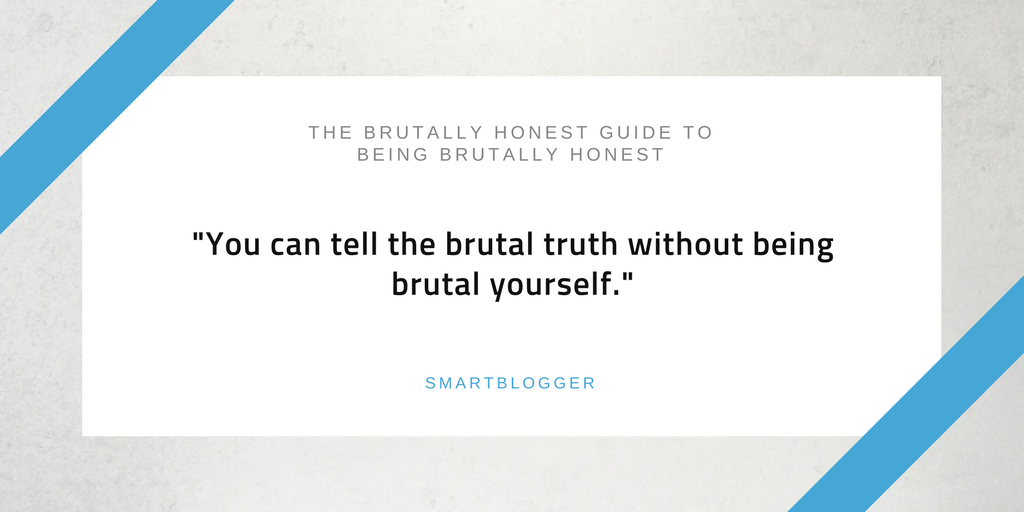
Don’t just launch straight into the tough love. Give them the opportunity to prepare themselves for it.
Explain that you care about them. Explain that you have to tell them something you believe they need to hear, and prepare them for the degree of honesty they’re about to get from you.
For an example, look no further than what I did in the intro to this post:
It doesn’t take much. Just a heads-up about what’s coming, so that your audience can put themselves in the right frame of mind for it. Blindsiding them won’t make them more receptive to hearing a brutal truth.
Why are you telling them this difficult truth? What do you want to come of it? How is hearing it worthwhile to them?
Understanding what they have to gain from it will make the other person much more receptive to the harsh truth. It will be much easier for them to hear and accept if they genuinely believe that you’re trying to help them.
So take a moment to tell them why you think what you’re about to tell them is the best thing for them.
Again, you can see how I did that in this post. Before I hit you with the brutal truth, I first told you how I thought it would benefit you:
And then, with the benefit still fresh in your mind, I took off the gloves and told you the blunt truth.
It’s never a good idea to beat a dead horse. As a writer, it’s a great way to get people to stop reading.
But this is even more true when your reader is taking a beating, too. Being told a hard truth is never fun. Sometimes it’s necessary. But having it thrown in your face over and over is something few people react well to.
So get to the point. Make it clearly and succinctly, and move on.
Anything more, and you’re heading back toward being more brutal than honest.
If you can’t be brutally honest with people, especially when you know it’s in their best interest, you’re a coward.
Notice how I don’t dwell on the cowardice for too long? Instead, I quickly move on to explaining the reasons behind my remarks.
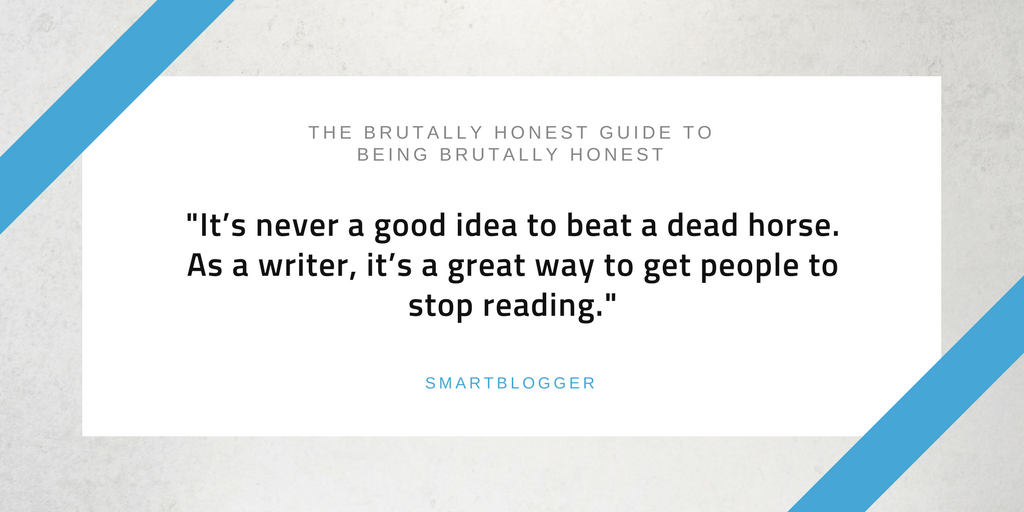
This is easier for some topics than it is for others. Sometimes the facts are clear, measurable, and objective. You’ve got actual data, research — cold, hard facts. Other times, the issue at hand is a subjective assessment.
But even when the subject matter is wholly subjective, you can keep the discussion focused on the relevant issues.
Be as objective as you can, given the subject matter. Avoid emotional observations. Focus on actions — things the other person has done, or things they need to do — rather than on character and personality.
Most of all, focus on problems that can be solved.
Again, you can see that in my approach to this post. I didn’t dwell on negatives or beat you over the head with character flaws. As you can see below, I focused on the facts — which, in this case, meant explaining why I had just called you a coward by emphasizing things I knew you’d agree with:
You may convince yourself it’s “nicer” to hide or obfuscate things that are difficult for them to hear, but it’s not.
Ignorance doesn’t lead to bliss, it leads to bad decision-making. There’s nothing “nice” about that.”
Don’t leave them feeling bad because of the truth bomb you just dropped on them. Help them figure out a solution. Give them a way forward.
Most of all, tell them how you’re going to help them, and commit to helping them tackle the issue.
How you end the discussion can make all the difference.
Do you want them to feel defeated, beat down, and discouraged? Or do you want them to feel hopeful that there are concrete ways that they can address the issue?
Imagine if I ended this post after calling you a coward, without offering any advice on how to deliver brutal truths. That would make the overall message feel far less benevolent and far more antagonistic, wouldn’t it?
Telling someone a hard truth can be scary.
Because you don’t know how people will react.
And I won’t lie. Some people won’t like it. Even if you take all the right steps, you may still offend them, and you may still lose them.
But you’ll also gain others who recognize the value of someone they can trust to be honest — the type of people who may never have paid attention to you while you were busy telling everyone what they wanted to hear.
And as you develop a reputation as a person who tells it straight, you will gain people’s respect. You will gain credibility and authority. People will seek out your advice, value your perspective, and appreciate your honesty.
And you will help people—far more than when you were telling them whatever they wanted to hear.
And isn’t that the point?

Is your Sales team completely bought in to video marketing? Fact is, video plays an essential role in the sales process and can allow for better closing...
The post The Three Fundamental Purposes of Video that Every Sales Team Must Understand appeared first on The Sales Lion.

Let me guess …
Every success in your writing career has been a fluke.
When people praise your work, they don’t know what they’re talking about.
You’ll never measure up. You’re not a real writer. And any day now, everyone will see you for the fraud that you are.
That’s how you feel, anyway.
You read other blogs and feel crushed at how little you know and how little you have to offer. You wonder why you even bother with your own blog when so many great writers do it way better than you ever could.
Well, here’s a secret …
Those writers you admire probably feel the exact same way.
Even famous writers like Neil Gaiman, Tina Fey, and Seth Godin are on record that they still feel like frauds — like they don’t deserve their success and they’re getting away with something.
We all do.
I have been a freelance writer for over three years, but I still feel I have no right to claim that title — writer.
I have a nagging voice inside my head that constantly reminds me of my unworthiness. It tells me to give up before I’m laughed off the Internet. That I’ll never compare to other writers — the real ones.
It provides a symphony of thoughts like:
“Who do you think you are?”
“Why would anyone care what you have to say?”
“Sooner or later, they’ll find out you have no clue what you’re doing.”
I call this voice the “Imp.” Her full name is Imposter Syndrome, and chances are you’ve already met. If you’ve ever had that dread of being outed as a fraud because you don’t stack up to other writers, you’ve experienced Imposter Syndrome, and you have an Imp of your own.
Imposter Syndrome is common across industries, but writers are especially susceptible.
Why is that?
Writing is a peculiar profession.
One thing that sets us apart is that we work in isolation.
That means nobody’s around to tell us we’re doing a great job until we put it out there for total strangers to judge. We’ll often work for a while on a project with no direct feedback, so it’s easy to start second-guessing our ability.
We have nobody to discuss our doubts with, so we are locked into internal conversations, which makes the Imp’s voice sound all the louder.
Working in isolation also means we don’t have any peers around to compare ourselves with, which leads us to compare ourselves with industry giants. No wonder we feel like we don’t measure up!
This also leads to us to create standards for ourselves that don’t exist. After all, you don’t see the time and effort other writers put in. You just see the result. That blog post that seems so effortless could be the result of weeks of work. But when you fail to churn out a perfect first draft, it means you’re an amateur.
The writing profession becomes even more dangerous when you step outside your comfort zone. You may have pitched an article to a large publication, and to your horror, they actually said yes. Then the insecurity takes hold and the fear of being exposed as an imposter rears its familiar head.
Sigh …
So are we doomed to deal with this nagging voice throughout our profession?
I’ll be honest; you may never fully get rid of it.
But you can learn to live with it.
The first step on your road to recovery is to be aware that isolation, new challenges, and pointless comparisons are common causes of Imposter Syndrome. You may not always be able to avoid them, but if you are mindful of their effect, it will help you wrestle your Imp to the ground when needed.
And here’s how to do it.
The first step to beating Imposter Syndrome is to tackle one of its main causes: isolation.
You need to make friends with other writers who are at the same stage in their careers. You need to have people around you who understand you, who make you feel part of the writing community instead of an intruder.
Here are a few ways to meet other writers:
Meet writers who are your peers, see who you get along with, and then join or start a mastermind group. Get together every week with a small group of people (around 4–6) and discuss what you’ve been up to and what’s been on your mind.
Share your fears and frustrations, and find comfort and reassurance in your similar experiences. You’ll inspire and encourage each other to grow as writers.
And as you grow, give back to the community by mentoring less experienced writers. Not only will you be helping others, your confidence will strengthen as you prove to yourself you do know what you’re doing and people do care what you have to say.
It’s rewarding and empowering at the same time.
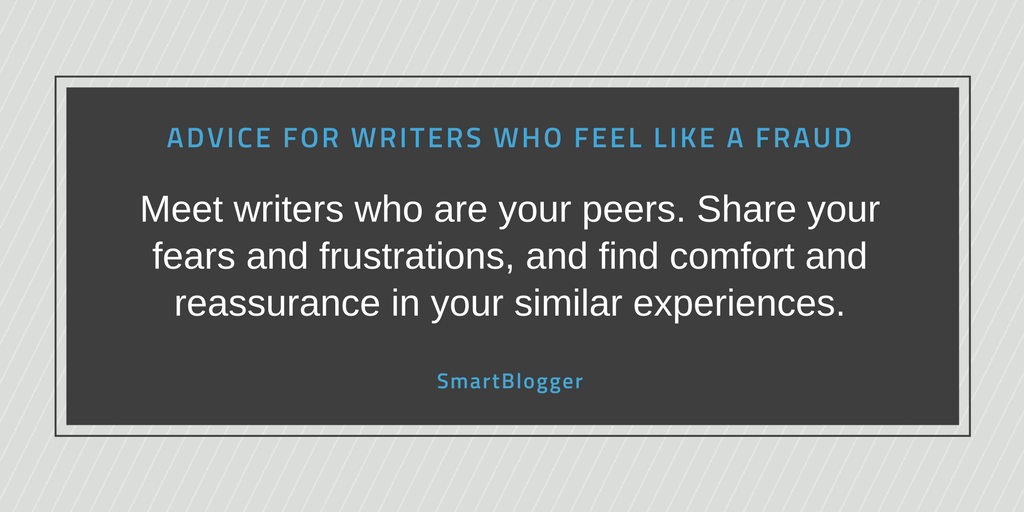
The Imp comes with a cruel twist. It won’t just berate you for failures; it will berate you for successes as well.
When a pitch is rejected or an article bombs, your Imp will use it to convince you that you don’t have what it takes. Having a few failures in a row can make you want to curl up in a ball of despair.
On the other hand, when your writing is successful and gets glowing responses, your Imp will convince you it was a fluke. It will make you feel like you’ve now set expectations you’ll never be able to meet again.
The effect is the same. You procrastinate.
Because no idea feels good enough. You never feel prepared enough. And nothing you write feels like it stacks up.
You get stuck over-analyzing and don’t start anything new.
But the trick to beating your Imp is to keep yourself busy. Because the more you have on your mind, the less time you have to listen to that debilitating inner voice.
So prepare for these situations by creating an action plan. Have a list of tasks ready for whenever they come up, so you won’t have time to drive yourself crazy.
For example, when a pitch is rejected, you might make a point to ask for feedback, find different sites to pitch, or come up with 20 new headlines.
When a post takes off, you might make a point to read all the comments, identify what connected with readers, and see if you can find ideas for a follow-up post.
Whatever you do, stay active, and end each plan with you writing your next post.
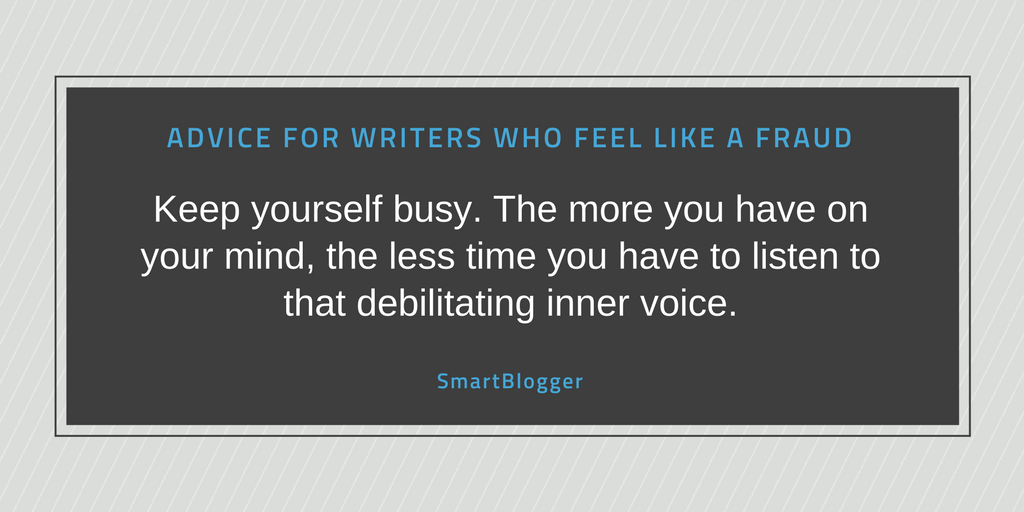
Most of us have an instinct to devalue our talent. When a post does well, we think we got lucky. When someone compliments our work, we shrug it off.
But those are terrible habits.
You need to take responsibility for your victories.
When a post does well, you did that. When you get a compliment, you earned that.
And you should never forget it.
So log your victories in a “nice things” file. Log accomplishments big and small. Log every compliment you receive. Print them out or store them in Evernote.
Then read them on a regular basis. It will banish your Imp and reinforce your belief that you have talent. It will reinforce your belief that people value your work. Plus, it just feels good.
It’s okay to bask in your own glory from time to time.
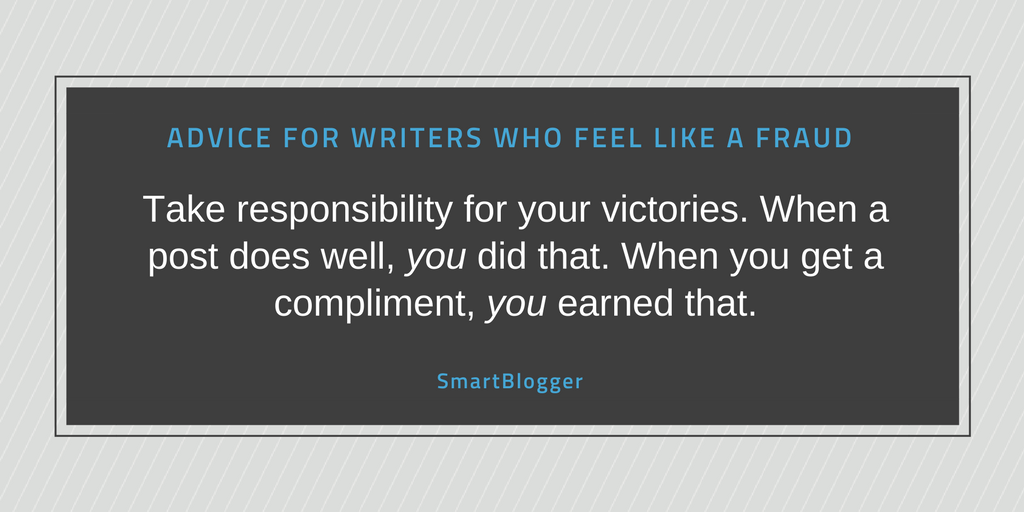
As writers, we put ourselves out there as experts, which can feel intimidating.
You feel pressured to put forth a veneer of perfection. You don’t want to show the cracks in your knowledge, as that would show everyone you’re not an expert at all.
Because you don’t feel like one. You’re certainly not as much of an expert as those other guys, right? Because they know more than you?
So what if someone asks a question you don’t have the answer to? What if your post doesn’t include everything an expert would know? What if everyone realizes you don’t know everything?
Well, relax. Because readers aren’t looking for the holes and imperfections in your posts. They’re more interested in what you do know than what you don’t. The only one who’s worried about the latter is you.
Readers only care whether your knowledge and experience can help them reach their goals. You may not know as much as that other expert, but if you can do that, you’re expert enough for them.
Remember that.
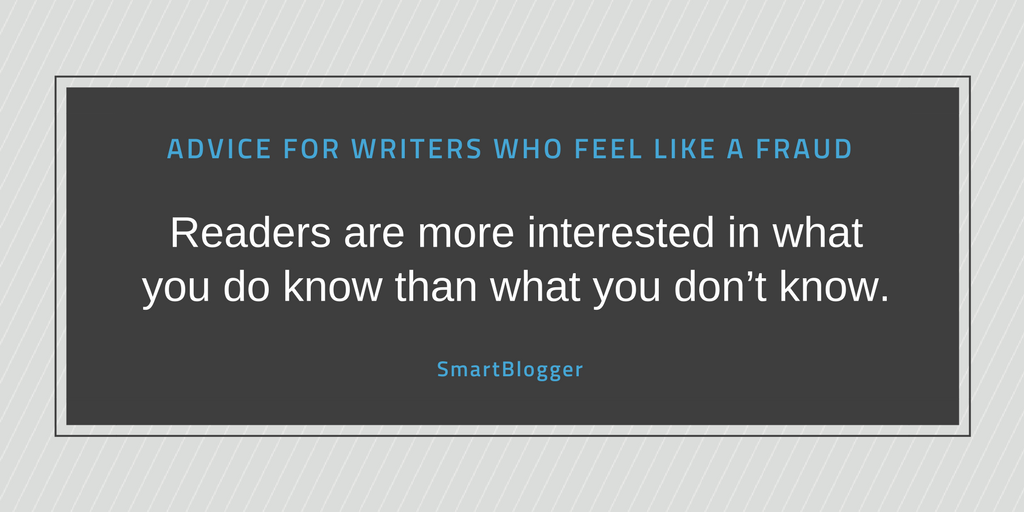
Your successes aren’t flukes.
You deserve all the praise you get.
And you are a writer — a real one.
So it’s time you finally convince yourself.
It’s time you fight back, wrestle your Imp to the ground and say, “Enough! I am smart, I am brave, and I earned everything I’ve worked for. I AM NOT A FRAUD!”
I’m right by your side, my fellow writer friend. Let’s do this together.
Let’s tear down the walls of isolation and surround ourselves with writers. Let’s stop feeling intimidated by success. Let’s stop expecting nothing but perfection from ourselves.
Let’s promise to keep writing no matter what, and let’s take responsibility for all the victories along the way.
Are you with me?

In this "resource packed" episode of the Hubcast, Marcus and George talk about Inbound Registration, and HubSpot's video tips for production and content...
The post Hubcast 145: INBOUND 2017 SESSION REGISTRATION, 14 Video Tips & #ISAYIT appeared first on The Sales Lion.

Let me guess …
Every success in your writing career has been a fluke.
When people praise your work, they don’t know what they’re talking about.
You’ll never measure up. You’re not a real writer. And any day now, everyone will see you for the fraud that you are.
That’s how you feel, anyway.
You read other blogs and feel crushed at how little you know and how little you have to offer. You wonder why you even bother with your own blog when so many great writers do it way better than you ever could.
Well, here’s a secret …
Those writers you admire probably feel the exact same way.
Even famous writers like Neil Gaiman, Tina Fey, and Seth Godin are on record that they still feel like frauds — like they don’t deserve their success and they’re getting away with something.
We all do.
I have been a freelance writer for over three years, but I still feel I have no right to claim that title — writer.
I have a nagging voice inside my head that constantly reminds me of my unworthiness. It tells me to give up before I’m laughed off the Internet. That I’ll never compare to other writers — the real ones.
It provides a symphony of thoughts like:
“Who do you think you are?”
“Why would anyone care what you have to say?”
“Sooner or later, they’ll find out you have no clue what you’re doing.”
I call this voice the “Imp.” Her full name is Imposter Syndrome, and chances are you’ve already met. If you’ve ever had that dread of being outed as a fraud because you don’t stack up to other writers, you’ve experienced Imposter Syndrome, and you have an Imp of your own.
Imposter Syndrome is common across industries, but writers are especially susceptible.
Why is that?
Writing is a peculiar profession.
One thing that sets us apart is that we work in isolation.
That means nobody’s around to tell us we’re doing a great job until we put it out there for total strangers to judge. We’ll often work for a while on a project with no direct feedback, so it’s easy to start second-guessing our ability.
We have nobody to discuss our doubts with, so we are locked into internal conversations, which makes the Imp’s voice sound all the louder.
Working in isolation also means we don’t have any peers around to compare ourselves with, which leads us to compare ourselves with industry giants. No wonder we feel like we don’t measure up!
This also leads to us to create standards for ourselves that don’t exist. After all, you don’t see the time and effort other writers put in. You just see the result. That blog post that seems so effortless could be the result of weeks of work. But when you fail to churn out a perfect first draft, it means you’re an amateur.
The writing profession becomes even more dangerous when you step outside your comfort zone. You may have pitched an article to a large publication, and to your horror, they actually said yes. Then the insecurity takes hold and the fear of being exposed as an imposter rears its familiar head.
Sigh …
So are we doomed to deal with this nagging voice throughout our profession?
I’ll be honest; you may never fully get rid of it.
But you can learn to live with it.
The first step on your road to recovery is to be aware that isolation, new challenges, and pointless comparisons are common causes of Imposter Syndrome. You may not always be able to avoid them, but if you are mindful of their effect, it will help you wrestle your Imp to the ground when needed.
And here’s how to do it.
The first step to beating Imposter Syndrome is to tackle one of its main causes: isolation.
You need to make friends with other writers who are at the same stage in their careers. You need to have people around you who understand you, who make you feel part of the writing community instead of an intruder.
Here are a few ways to meet other writers:
Meet writers who are your peers, see who you get along with, and then join or start a mastermind group. Get together every week with a small group of people (around 4–6) and discuss what you’ve been up to and what’s been on your mind.
Share your fears and frustrations, and find comfort and reassurance in your similar experiences. You’ll inspire and encourage each other to grow as writers.
And as you grow, give back to the community by mentoring less experienced writers. Not only will you be helping others, your confidence will strengthen as you prove to yourself you do know what you’re doing and people do care what you have to say.
It’s rewarding and empowering at the same time.

The Imp comes with a cruel twist. It won’t just berate you for failures; it will berate you for successes as well.
When a pitch is rejected or an article bombs, your Imp will use it to convince you that you don’t have what it takes. Having a few failures in a row can make you want to curl up in a ball of despair.
On the other hand, when your writing is successful and gets glowing responses, your Imp will convince you it was a fluke. It will make you feel like you’ve now set expectations you’ll never be able to meet again.
The effect is the same. You procrastinate.
Because no idea feels good enough. You never feel prepared enough. And nothing you write feels like it stacks up.
You get stuck over-analyzing and don’t start anything new.
But the trick to beating your Imp is to keep yourself busy. Because the more you have on your mind, the less time you have to listen to that debilitating inner voice.
So prepare for these situations by creating an action plan. Have a list of tasks ready for whenever they come up, so you won’t have time to drive yourself crazy.
For example, when a pitch is rejected, you might make a point to ask for feedback, find different sites to pitch, or come up with 20 new headlines.
When a post takes off, you might make a point to read all the comments, identify what connected with readers, and see if you can find ideas for a follow-up post.
Whatever you do, stay active, and end each plan with you writing your next post.

Most of us have an instinct to devalue our talent. When a post does well, we think we got lucky. When someone compliments our work, we shrug it off.
But those are terrible habits.
You need to take responsibility for your victories.
When a post does well, you did that. When you get a compliment, you earned that.
And you should never forget it.
So log your victories in a “nice things” file. Log accomplishments big and small. Log every compliment you receive. Print them out or store them in Evernote.
Then read them on a regular basis. It will banish your Imp and reinforce your belief that you have talent. It will reinforce your belief that people value your work. Plus, it just feels good.
It’s okay to bask in your own glory from time to time.

As writers, we put ourselves out there as experts, which can feel intimidating.
You feel pressured to put forth a veneer of perfection. You don’t want to show the cracks in your knowledge, as that would show everyone you’re not an expert at all.
Because you don’t feel like one. You’re certainly not as much of an expert as those other guys, right? Because they know more than you?
So what if someone asks a question you don’t have the answer to? What if your post doesn’t include everything an expert would know? What if everyone realizes you don’t know everything?
Well, relax. Because readers aren’t looking for the holes and imperfections in your posts. They’re more interested in what you do know than what you don’t. The only one who’s worried about the latter is you.
Readers only care whether your knowledge and experience can help them reach their goals. You may not know as much as that other expert, but if you can do that, you’re expert enough for them.
Remember that.

Your successes aren’t flukes.
You deserve all the praise you get.
And you are a writer — a real one.
So it’s time you finally convince yourself.
It’s time you fight back, wrestle your Imp to the ground and say, “Enough! I am smart, I am brave, and I earned everything I’ve worked for. I AM NOT A FRAUD!”
I’m right by your side, my fellow writer friend. Let’s do this together.
Let’s tear down the walls of isolation and surround ourselves with writers. Let’s stop feeling intimidated by success. Let’s stop expecting nothing but perfection from ourselves.
Let’s promise to keep writing no matter what, and let’s take responsibility for all the victories along the way.
Are you with me?